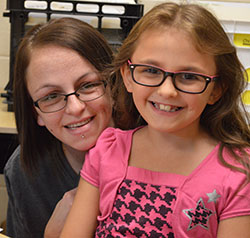Third-grader Aliyah VanDrunen beams with pride as she flawlessly reads several paragraphs. She can read 90 words per minute with 100 percent accuracy and is consistently staying at grade level and above.
She recently exited Paris Ridge Elementary’s reading intervention program after two years of steady gains. At her side were teachers, intervention specialists and her mother, Lisa Geister, who realized her daughter was struggling early on.
“She was having big troubles with reading,” Geister said. “Behavior-wise, she’s a good kid but she didn’t have the confidence, so that’s what they wanted to work on with her.”
Aliyah was well below grade level when she started working with intervention specialist Sarah Lane in one-on-one specialized sessions. “She was very frustrated,” her mother said. “She tried her hardest but couldn’t get it.”
Lane uses strategies from the district’s Multi-Tiered System of Support, a school-wide support system in reading and behavior. The district has spent the past four years implementing MTSS, in partnership with Kent ISD, in its five elementary and two middle schools. It aims to provide Aliyah and every other student what they need, from a strong core curriculum to intensive intervention.
MTSS is supported by the Michigan Integrated Behavior Learning Support Initiative, a state and federally funded project. Caledonia, Lowell and Kentwood are the first districts to start integrating the system.
While implementation involves a massive amount of training, collaboration and feedback, MTSS is based on a simple but somewhat novel concept: Reading and behavior tie closely together. Gearing instruction around that notion, coupled with a positive school-wide environment, can lead to to happier students and teachers and high achievement, educators say.
For Aliyah, it’s been a “godsend,” said her mom.
“Now she’s amazing. She’s up past where she should be,” Geister said. “Now she comes home from school and she’ll just get her backpack out and do her homework. The majority of it she does all on her own, and I check it when she’s done.
“It’s a big difference,” she added. “This program is amazing.”

A Streamlined Approach to Reading and Behavior
Teachers can attest to the link between reading and behavior. When students struggle academically, they are prone to fall further and further behind and act out or disconnect, said Janel Switzer, the district’s curriculum director.
Sometimes behavior isn’t disruptive; the child is just tuning out, asking to use the bathroom four times a day or staying home from school. That’s why confidence is a big factor.
Teachers first work to identify the root of the problem when students struggle, which varies from fluency to comprehension or vocabulary. They can then use the best intervention strategies to target the areas of need, Switzer said.
Soon, students see themselves becoming better readers. They document it themselves every step of the way.
“We are constantly giving them feedback like, ‘Look how much better you did today. You’re a rock star,'” added Aliyah’s third-grade teacher, Patty Pohl, who also taught her in second grade.
“They are constantly watching their own growth and they’re excited to see the gains and to celebrate that,” Lane said.
For Aliyah, MTSS could have changed the trajectory of her education. Her confidence grew along with her reading level with teachers pointing out small successes and big ones.
“She started seeing herself as, ‘Oh, I am getting this right.’ It slowly built up from there,'” her mother said.
Developing a Common Language
In Caledonia, encouragement and a positive way of dealing with discipline isn’t limited to intervention. Districtwide, books and positivity go hand in hand. One key element of MTSS is Positive Behavior Intervention and Supports, or PBIS, which is called Positive School Climate, or PSC, at the middle school level.
PBIS sets common language and expectations around behavior in fun ways. In the hallway, classroom, restroom, playground and cafeteria, students can earn Positive Attitude Wins tickets at Paris Ridge for good behavior to win prizes.
But it’s more than that. It’s a change in the delivery of expectations. There’s a subtle difference between saying, “Don’t run in the halls” and “Please walk in the halls,” Switzer said about switching language to the affirmative.
“Now she’s amazing. She’s up past where she should be.” — Lisa Geister, mother of Aliyah
Why does it matter? A common thread of positive culture and expectations makes things run more smoothly in every way, Switzer said. Lesson plans, videos and fun activities are embedded with themes like respect, responsibility and safety.
“Everybody from the people serving lunch to your custodians, to your classroom teachers to the principal, all have that same language and they are all acknowledging behaviors and expecting the same behaviors,” she said.
That’s MTSS at its core, Switzer said. It’s a framework for consistent strategies and expectations that can be applied no matter what textbook or resource is being used or what teacher is leading the class.
“When we have the same system throughout the building, the kids aren’t jumping though our hoops to try to figure out what does this teacher mean by this or that,” she added, “because they already understand the common language and framework.”
The Tools to Succeed
Aliyah said reading is now her favorite subject. Her go-to books at home are the “Diary of a Wimpy Kid” books, and Geister said she’s always asking for new books. “It’s fun,” she said. She even reads to her little brother, Johnathan, at bedtime.
Geister said she also sees the positive effect MTSS has had on her daughter Alexandra, a fourth-grader, and Johnathan, a first grader. Teachers credit Geister for adding another necessary component for MTSS to work: parent support.
“Now that they have the confidence and the tools from this program, they apply them every time,” Geister said. “They are doing their work. They love school.”
Supporting Educators working with MTSS:









